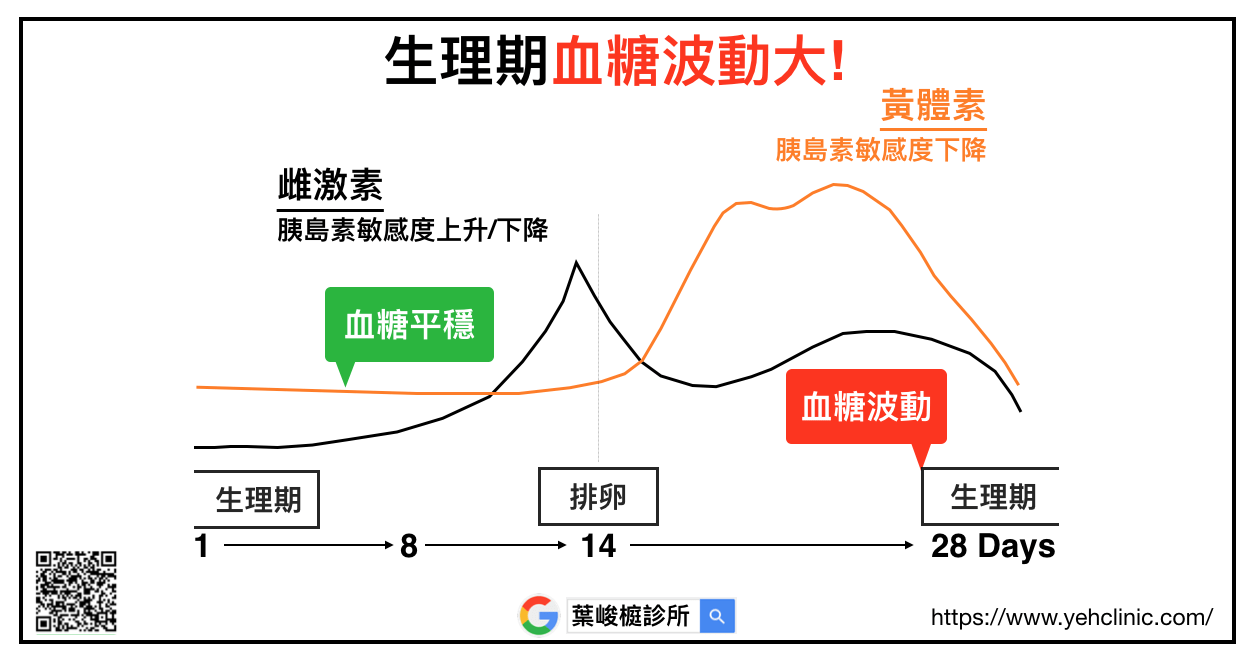"Endocrine" Blood sugar fluctuates greatly during menstrual period?!
✨Original source 🔜 https://www.yehclinic.com/blood-sugar-fluctuation-in-period/
The hormones secreted by the ovary and the pituitary gland can affect the menstrual cycle, and the main hormones secreted by the ovary are estrogen (Estrogen) and progesterone (Progesterone). will be affected.

follicular phase
At the end of the menstrual period, the ovaries enter the follicular phase, at which time the ovaries secrete estrogen. Some studies believe that too high or too low estrogen will reduce insulin sensitivity and cause blood sugar to rise.
But there are other studies that suggest that endogenous estrogen has little effect on blood sugar fluctuations. These studies have shown that estrogen is related to insulin sensitivity, but the results of the studies are not completely consistent with the views of scholars!
luteal phase
After ovulation, the ovaries enter the luteal phase, when the ovaries secrete higher levels of progesterone. Current research consensus is that progesterone can lead to decreased insulin sensitivity and increased blood sugar.
After ovulation, because the concentration of progesterone begins to climb and insulin sensitivity is affected, blood sugar fluctuations will become larger in the first few days of the menstrual period, and this situation will continue until the end of the menstrual period.
But there are exceptions to everything. Some studies have found that hypoglycemia occasionally occurs during the physiological period. According to research, it may be that estrogen causes insulin sensitivity to increase, leading to hypoglycemia!
Others such as follicle-stimulating hormone (FSH), luteinizing hormone (LH), androgen (Androgen) and body fat composition are also related to blood sugar fluctuations.
blood sugar fluctuations
Before the menstrual period, there may be premenstrual syndromes such as mood changes, breast tenderness, gastrointestinal discomfort, lethargy, and craving for food (sweet food). harder to control.
In addition, the blood sugar fluctuations caused by the physiological period vary from person to person, and the monthly changes of the same person may also be different.
in conclusion

Progesterone causes a decrease in insulin sensitivity, resulting in an increase in blood sugar. Therefore, for diabetics, it is necessary to record the start and end time of the menstrual period, premenstrual symptoms, diet records, etc., to find out the pattern of blood sugar changes; if insulin is administered, the dosage must be adjusted in time according to the blood sugar level. (Don't stand in a daze next to the husband/boyfriend, considerate actions are essential!)
Author: Dr. Ye Junju ( Metabolism Specialist , Lecturer of American Sports Medicine Association , Medical Consultant of Ogma Fitness Center , Consultant of Compal Computer Project )

References
1. Williams Textbook of Endocrinology, 13th Edition. Chapter 17 Physiology and Pathology of the Female Reproductive Axis.
2. Longitudinal Study of Insulin Resistance and Sex Hormones over the Menstrual Cycle: The BioCycle Study. JCEM 2010;95(12):5435-5442.
3. Sex Hormones, Insulin Sensitivity, and Diabetes Mellitus .
4. Periods (Menstration) and Diabetes .
Like my work? Don't forget to support and clap, let me know that you are with me on the road of creation. Keep this enthusiasm together!

- Author
- More